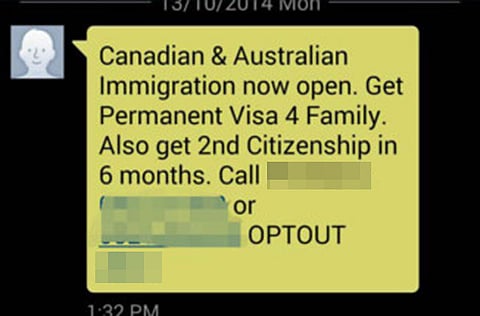Spam text messages: How firms get your mobile number
Unsolicited texts continue despite ‘address harvesting’ rules

Dubai: Spam text messages continue to target UAE mobile phone subscribers despite rules against the practice.
Many subscribes said they are targeted daily by at least one or two unsolicited SMSs from businesses. Some said the SMSs continue even after they have opted out of receiving them. Late night or early morning spam has also been reported to be a problem.
Some 20 million unwanted promotional SMSs from international companies and promotional firms were blocked by UAE telecom operators by mid-2013, a Telecommunications Regulatory Authority (TRA) official said earlier.
The TRA had in 2009 introduced a policy against mobile spam, mandating UAE telecom companies to provide a way for customers to request blocking of spam.
In the first quarter of 2013 alone, over 3,000,000 requests were processed by UAE phone companies to stop receiving spam from UAE-based companies and promotional firms.
“The controls in essence require a prior consent from the customer to receive such communications. This consent is mandated to be provided in tangible format when needed. This is applicable on the licensees [telecom providers] and in turn is mandated that the licensees convey the same obligation on the companies utilising the operator’s SMS services,” the TRA said.
However, many subscribers said they had never given prior consent for the SMSs they received.
“Sometimes I get messages from businesses I’ve never heard about, let alone visited their shop, to give my approval in writing for receiving SMSs. You think to yourself, ‘who are these people and how did they get my number?’” said British expat Mohammad Omar, 38.
The TRA said: “There seems to be a general assumption that it is the telecommunications operators who give out the telephone numbers of their customers. However, that is not necessarily true.
“There are many sources from which telephone numbers could have been obtained. The TRA has jurisdiction over the telecommunications operators only and not the other potential sources.”
Some businesses do provide a form that allows customers to explicitly opt for SMS promotions. However, other shop attendants only verbally ask for customers’ mobile numbers while they are paying at the counter, without stating the reason.
It may or may not be implied the number will be listed for receiving SMSs.
“This is not ‘tangible consent’, if you ask me. But some customers don’t even inquire, ‘why do you need my number? They could easily tell staff, ‘please don’t send me spam.’ So whose fault is it when the customer willingly gives out his number and gets promotions through SMS?” said Ali Rashid, a 34-year-old Emirati.
Mobile numbers could also be taken from business cards or registration forms dropped at campaigns or conferences.
Other sources could be “data scrappers” who glean mobile numbers online and sell them to third parties. A Dubai-based software expert said on condition of anonymity that “web crawlers” can be developed to collect millions of numbers automatically.
“Data is big business. If you can get 100 million records of people, and if only 10 per cent are useful — that have mobile numbers, in this case — that’s a big number. If only one if four people buys your product from that list, you’ve made serious money,” he said.
“There’s a whole industry behind this now. There are fake job sites and real job sites that sell your mobile number; there are survey people who do this; hackers; and many others ways to get your number.”
Hand Aly, executive vice-president of enterprise business at du telecom company, said: “We urge customers to pay more attention when they share their personal details with third parties. These details can be used by different parties in different ways, and this may enable them to receive unsolicited text messages.”
“Telecom operators also play a role in public education. We can define key words on their back-end systems to trigger and filter any spam messages and block them when needed. This capability is available and can be enabled easily.”
A comment from etisalat, the UAE’s largest telecom company, was not available.
